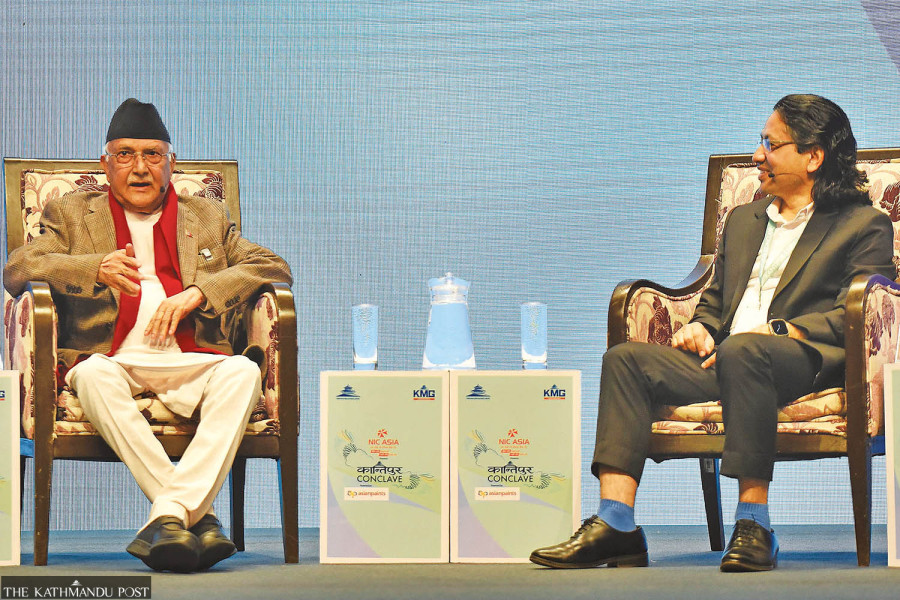Politics
My visit to China won’t harm Nepal’s ties with India: Oli
Prime minister says he has never ruled out visiting the southern neighbour and will travel where it is convenient.
Post Report
Prime Minister KP Sharma Oli said that his upcoming China visit will not hurt Nepal’s ties with India.
Speaking at the concluding session of the Kantipur Conclave in Kathmandu on Thursday, the prime minister, who is set to visit China in the first week of December, stated there is no reason for his visit to harm relations with India just because he is going to China first than India.
“We are a sovereign nation and we have never said that we won’t visit India,” the prime minister said, adding, “We choose to go where it is convenient.”
Traditionally, Nepali prime ministers have made India their first port of call after assuming office. However, after failing to receive an invitation from India for several weeks, the prime minister went to New York to attend the 79th session of the UN General Assembly where he met Indian Prime Minister Narendra Modi, Chinese foreign minister Wang Yi, and several other world leaders.
“I went to the US to attend the UN General Assembly because the UN is [headquartered] in the US, where I met several world leaders, but it does not mean that I wanted to visit the US first,” said Oli, adding, “We are surrounded by two great neighbours and we have to maintain good relations with them.”
“And my visit to China will not damage our relations with India. Our relations with India are deep, historical, based on culture and tradition, and predate the formation of modern states. We are sovereign nations and make foreign trips as per our convenience,” said Oli.
Oli was speaking at the Kantipur Conclave’s concluding session moderated by Kantipur Editor-in-Chief Umesh Chauhan on Thursday.
During the interaction, Oli discussed a range of domestic issues including the country's economy, national politics, issue of constitution amendment, relations between the federal and provincial governments, and the arrest of Rastriya Swatantra Party chairman and former deputy prime minister Rabi Lamichhane, among other things.
Responding to the ongoing street protests by Rastriya Swatantra Party supporters opposing the arrest of their party chief, and the calls by some groups calling for the restoration of monarchy and dissolution of the current constitution, the prime minister said he is ready for any kind of open discussion on these issues.
He said he welcomes dialogues on the future of the political system, but won’t allow the constituion to be torn down.
Oli also defended the progress made over the last three decades (since the restoration of democracy in 1990), highlighting significant strides in infrastructure. “Road networks have now reached 98 percent of the country.”
On the arrest of Lamichhane, who is in police custody on charges of cooperatives fraud, the prime minister stated that he cannot protect Lamichhane if he had committed wrongdoings.
"The court will look into his case…if someone makes mistakes and blames others, it is unacceptable," said Oli.
Oli also gave some background on how he had helped Lamichhane and hired him as a television anchor when he was jobless. “I gave him the job, and he later joined politics,” said Oli, adding that he would not tolerate corruption.
I favoured him, but I never thought that Rabi was involved in cooperative scam,” said Oli, and claimed that he was initially against forming the parliamentary probe, but Pushpa Kamal Dahal and Lamichhane himself requested such a probe.
Rastriya Swatantra Party’s protests and demonstrations “aimed at pressuring the court” are unacceptable, Oli said, adding, “Let the law take its course.”
The prime minister also dismissed the allegations that the government was working on a new law on political parties to facilitate party splits. “There is a void so we have to bring a new law,” he said, adding “The UML does not need to be the largest party to claim the premiership.” It is believed that the government wants to make party splits easier, because the UML wants to merge dissident groups in a few parties including the CPN (Unified Socialist) and the Janata Samajbadi Party into its fold.
Speaking at the conclave, the prime minister said the government will bring laws to support provincial governments.
“We will review the constitution. We will enact laws. We will provide them [provinces] the required rights.”




 14.12°C Kathmandu
14.12°C Kathmandu













